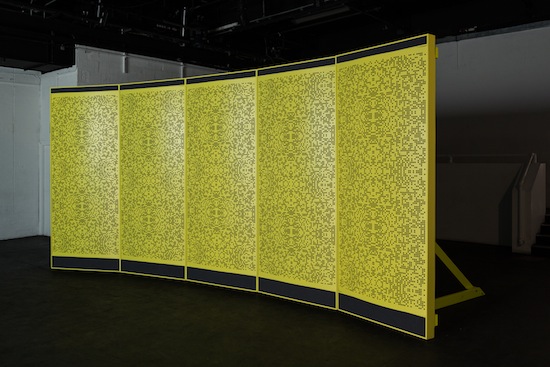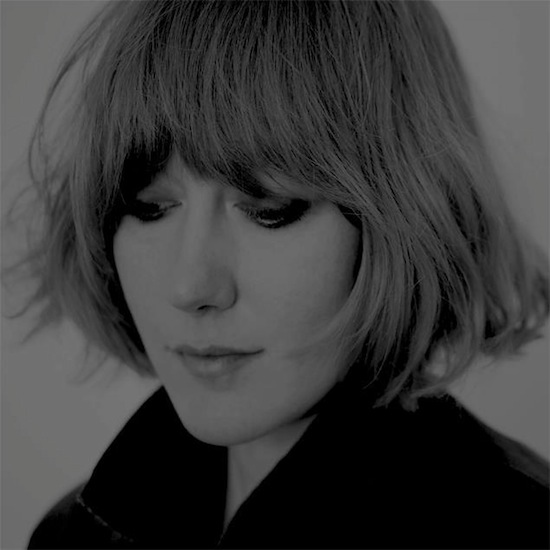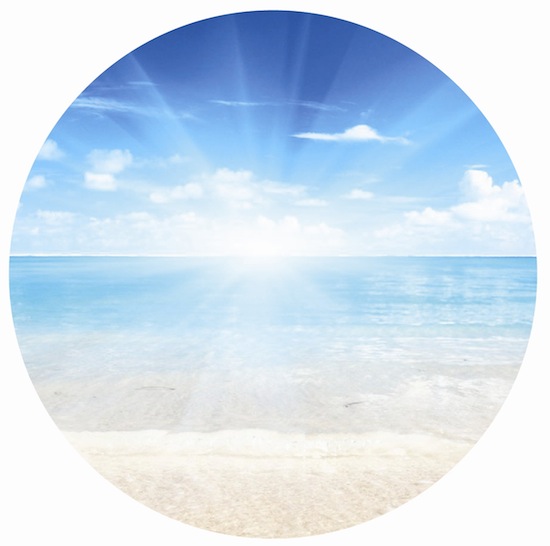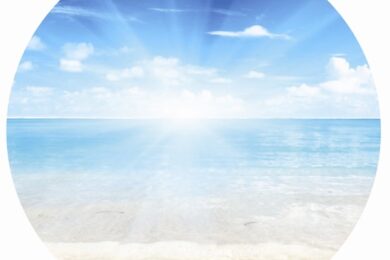Tomorrow sees the excellent annual Wysing music festival take place in rural Cambridgeshire near Bourn. This year’s edition is titled Space-Time: The Future and will take place across three indoor stages, with both live music and performances involving a primary focus on women in experimental and electronic music, post-punk and the visual arts. While there is much healthy debate surrounding the issue of all-female lineups, director of Wysing Arts Centre Donna Lynas, defended the decision in an interview with M Magazine earlier this year, stating "I don’t want our festival to get dragged in to some negative gender war. I just want it to be an enjoyable, celebratory experience."
The day’s events will include performances from Factory Floor’s Nik Colk Void, Holly Herndon, whose ace 12" ‘Chorus’ came out earlier this year, and Karen Gwyer of Opal Tapes and No Pain In Pop, as well as an evening of techno from the brilliant PAN and Werkdiscs-certified Helena Hauff, composer Ashley Paul, cellist Lucy Railton, Glasgow-based visual and performance artist Sue Tompkins, and Hannah Sawtell, who works with video, digital image, sculptural installation, printed matter, industrial design, performance and noise. Between stocking up on tins of Bloody Marys for tomorrow’s post-Friday night bracing 8 am bus journey, we spoke to Lucy Railton, Hannah Sawtell and Karen Gwyer about how they got involved and what we can expect.
Hannah Sawtell – Gallery Stage, 4.15 pm

Photograph courtesy of Mark Blower
How did you get involved with this year’s Wysing Festival?
Hannah Sawtell: I was in New York installing an exhibition there and I received an e-mail from Donna Lynas inviting me to perform. I had heard a little about their previous events from Paul Purgas of Emptyset, but didn’t know much. I was intrigued.
What do you think about all female line-ups, as Wysing have booked? Are there negative as well as positive connotations?
HS: At the beginning I didn’t realise it would be just women playing. I think broadly festivals should attempt parity between male and female artists booked. I’m looking forward to Space-Time: The Future, it will be a unique event.
Did you consider the festival title of Space-Time: The Future in preparing your piece? If so, how did you respond to it?
HS: No I didn’t, but I think the title could relate to some of the things I make. In its statement-like urgency and perhaps a literal way, my performances and installations have the audience and the space where the sound and light occurs as a prominent part of the work. I use basic contemporary media, tablet/phone/computer apps, to make dense digital noise and what I see as ‘direct rhythms’.
Will this be an audiovisual performance?
HS: HS: I’m not using video, or the sound mirror structures I design, for this one. This is the fifth iteration of a performance, where I use only a strobe and digital sound tools as integral parts. My intention is to create a solid, pulsing, monochrome, late night, schizo-spacial situation of audience, digital sound and light.
Do you see collage as a practice that can exist across media?
HS: Yes, I use collage techniques in video/image/installation/performance and sound. I leave the rough edges. To me they are statements of intent. Like a cut, that causes a friction.
Who else are you looking forward to seeing at Wysing?
HS: I met Holly Herndon this year in New York when we were both giving a presentation for Rhizome’s Seven On Seven event, it will be good to see her.
Lucy Railton – Gallery Stage, 5.15 pm
What do you think about all female line-ups, as Wysing have booked? Are there negative as well as positive connotations?
Lucy Railton: Gender aside, it’s a line-up of artists making interesting work – Wysing’s curation focuses on artists from a breadth of practises with out being genre-specific, that’s what excites me about the line-up. I think for me the only interest in an all female line-up is to do with the experience. Not being the minority sex amongst a programme is rare and for that reason only it’ll be a different experience with a different energy. It’ll be interesting. I was a part of the Her Noise: Feminisms and the Sonic event at the Tate a few years ago, which focused on the work of Pauline Oliveros. I had my reservations about being a part of an all-female band, and speculated the need for a gender specific performance, but it threw up all kinds of questions about environment and response, how different it is to work with just women rather than just men. It is just the way of the industry, that men prevail in numbers, and this is what I’m used to, it’s not an issue, it’s just the way it is. Wysing could throw up these questions again, but for me the focus is on the quality of the programme and I’m sure that is where the anticipation for the event lies for all.
Did you consider the festival title of Space-Time – The Future in planning what you were going to do?
LR: I have made a podcast for the festival, I focused on artists who have had radical ideas in the past, who have shaped the future of music, that was my response to the theme. In my own work I am yet to think about the future, at the moment I’m thinking about now.
Would it be to let the cat out of the bag to ask what you’re planning?
LR: It involves a cello.
Who else are you looking forward to seeing at Wysing?
LR: It’ll be the first time I’ve seen a lot of the artists on the line-up perform, so in that respect I’m curious about all of it. I’m looking forward to seeing diverse acts side by side and how that works as a structure throughout the day. People’s work I already know and I’m excited to hear live are Ashley Paul, Hannah Sawtell, Nik Colk Void and Helena Hauff – that’s a mix you won’t see very often. Saying that, the whole day looks great and I plan to see as much as possible.
Karen Gwyer – Amphis Stage, 9.30 pm

What have you got planned for your set at Wysing? Are you tailoring it around the Space-Time: The Future theme at all?
Karen Gwyer: I’m waffling between two different sets, both new, and I’ll probably decide right beforehand, which is maybe not the smartest move. But I’d rather see how the atmosphere is. They were put together during a big push recently, helped greatly by my acquisition of an Octatrack (more further down), to firm up a ton of ideas that have been floating around during the period after my last release. Wysing has been hovering in my head all summer, and while I haven’t specifically thought, "Right, now for space-time with a bit of future", I’ve been busy laying down a framework for how I hope to proceed in the coming months.
Who are you hoping to catch on the rest of the line-up?
KG: Scheduling issues of a domestic nature have meant that I’m not able to see much of the festival, which is really frustrating. In this case I feel really apologetic and sheepish about not being able to see more of it. But I am making sure that I’ll be there to see Helena Hauff.
Have the live sets you’ve been playing this summer helped catalyse ideas for some new material?
KG: Yeah, I played a couple radically different gigs that forced me to stretch way out. I mean, I suppose you’d naturally associate my stuff somewhat with a church these days, as a lot of people have said they do. But for me, playing in a church in July [for St John Sessions in Hackney, London] was a chance to really go full steam heavy church free jam. I really indulged, and as I get more confident playing live in general, that letting go of the need to have a strict plan is taking things in different directions. I’ve been recording a ton recently, and finally I feel like I’m getting somewhere with the attempts to bring the freedom of a live performance into my back room.
You mentioned some new hardware, the Octatrack. How’s that working out for you? Will it be making an appearance this weekend?
KG: The Octatrack is always with me now. It’s just incredible. I’ve only scratched its surface so far, but with the basics, I’m flying through stuff that used to take ages. Now, it’s so much less about the grid sequence agony and pinhead file sizes, and much more of a flexible instrumental experience that I can take risks with.
You’ve got a pretty amazing looking Opal Tapes tour coming up in October, which goes all the way from Bradford to St Petersburg, not to mention a spate of festival appearances and a gig at Cafe Oto with Luke Abbott and Laura Cannell. Which are you most looking forward to?
KG: Oh, all of it. In the short time I’ve been playing live, I’ve come to learn that every gig is a different beast. Audience and venue combos are so wildly different, and all the little details surrounding the event, like the wee sandwiches or the occasional ice cream, certainly the booze, and the folks who do approach even though I’m sure I often appear distant and perhaps grumpy, make each date a particular little nugget of time and space that informs the next. And there’s the delight of being grouped together with other musicians you’ve never met and often aren’t familiar with at all in a curation that was for someone a real exercise of creativity and organisation. I look forward to them all. I don’t know if I can better the moment on the previous Opal Tapes tour when it became apparent that Koenraad and Andrea of Lumisokea appreciate viola jokes as much as I do, though. We’ll find out soon.



